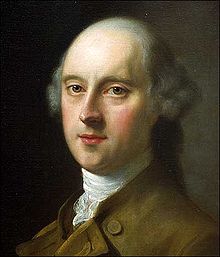“I wished his Lordship to urge him to go into particulars”
On the evening of 23 Nov 1774, Josiah Quincy, Jr., recorded in his London diary, “Mr. Inspector [John] Williams waited on me with the Compliments of Lord Dartmouth and requested my visting on tomorrow 10 oClock.”
The Earl of Dartmouth was the British government’s secretary of state for North America from 1772 to 1775. He was thus the supervisor of all the royally appointed governors and the chief architect of the London government’s imperial policies.
In his diary Quincy added, “Mr. Williams gave me a curious account of a Conversation with his Lordship relative to my Observations.”
That referred to Quincy’s longest political work, published in Boston in May: Observations on the Act of Parliament, Commonly Called “The Boston Port Bill,” with Thoughts on Civil Society and Standing Armies. You can read the published text here, and a transcription of Quincy’s manuscript here. While he was in London, the Dilly brothers printed their own edition.
Unfortunately, we don’t know what “curious” things Lord Dartmouth had said to Williams about Quincy’s little book. Earlier that same day Lord Dartmouth consulted with former governor Thomas Hutchinson, who wrote:
On 24 November, the young Massachusetts lawyer arrived for his meeting with the secretary of state. Quincy recorded in his diary:
Quincy didn’t record how the earl responded to that hint, but he did record this exchange:
But he wasn’t hearing what Lord North and Lord Dartmouth were really saying.
TOMORROW: How the ministers thought of Quincy.
The Earl of Dartmouth was the British government’s secretary of state for North America from 1772 to 1775. He was thus the supervisor of all the royally appointed governors and the chief architect of the London government’s imperial policies.
In his diary Quincy added, “Mr. Williams gave me a curious account of a Conversation with his Lordship relative to my Observations.”
That referred to Quincy’s longest political work, published in Boston in May: Observations on the Act of Parliament, Commonly Called “The Boston Port Bill,” with Thoughts on Civil Society and Standing Armies. You can read the published text here, and a transcription of Quincy’s manuscript here. While he was in London, the Dilly brothers printed their own edition.
Unfortunately, we don’t know what “curious” things Lord Dartmouth had said to Williams about Quincy’s little book. Earlier that same day Lord Dartmouth consulted with former governor Thomas Hutchinson, who wrote:
Lord Dartmouth…had just received Quincy's book, and another pamphlet, which somebody, he said, had just sent him in. He asked me the character of the book, and of the man, which, when I had given, he said he had seen letters from persons in Boston to persons of respectable characters here, recommending him as a person well disposed to bring about a reconciliation between the Kingdom and the Colonies.The earl had also consulted with the prime minister, Lord North, about his own meeting with Quincy a couple of days before. Dartmouth told Hutchinson:
Lord North looked upon his [Quincy’s] design to be to represent the Colonies in the most formidable view; and at the same time supposed the measures taken in England to be caused by misrepresentation.Hutchinson replied, “I wished his Lordship to urge him to go into particulars.” In other words, if he’s blaming me, he should come out and say it.
On 24 November, the young Massachusetts lawyer arrived for his meeting with the secretary of state. Quincy recorded in his diary:
Waited upon Lord Dartmouth and had about an hour and a half’s conversation with him. I was convinced, that the American and British controversy would be much sooner and much more equitable settled, if it was not for the malevolent influence of a certain Northern personage now in Great Britain.Still not naming names, but Hutchinson was behind all the trouble.
Quincy didn’t record how the earl responded to that hint, but he did record this exchange:
Lord Dartmouth being called out for a few minutes to attend the physicians of his Lady, made his apology, and taking up a pamphlet that lay on his table, said “I would entertain you with a pamphlet during my absence, but I fancy you have seen this—I think you know the author of it—Do’n’t you?” His Lordship bowed with a smile, which I returned, and he retired for a few minutes.Once again, Quincy was flattered by the amount of time a government minister devoted to talking with him and the politeness of those British aristocrats.
But he wasn’t hearing what Lord North and Lord Dartmouth were really saying.
TOMORROW: How the ministers thought of Quincy.


No comments:
Post a Comment